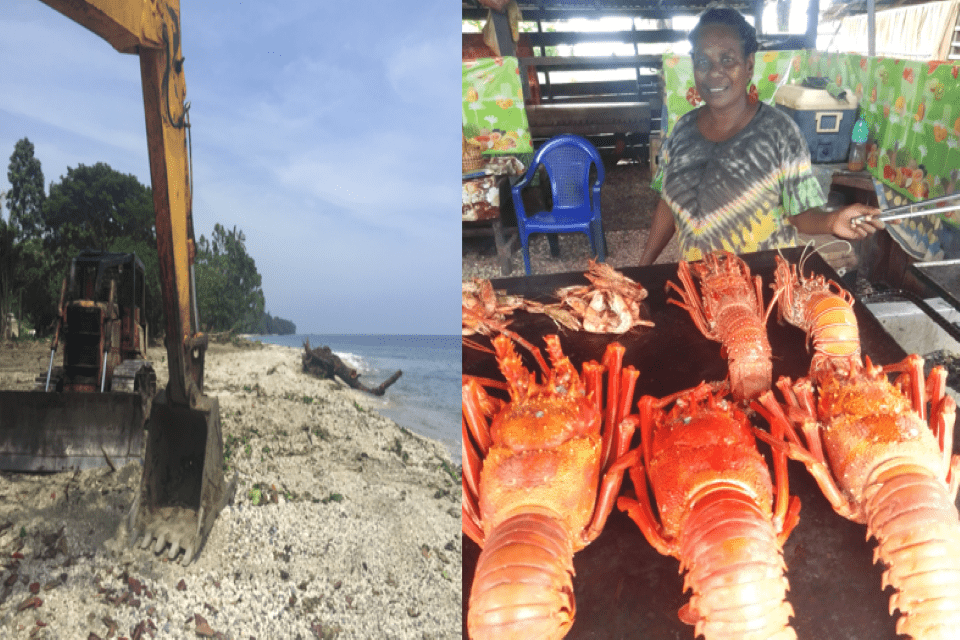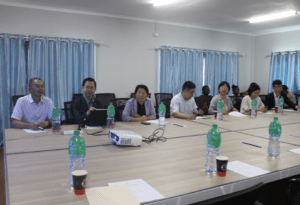BY JOHN HOUANIHAU
THE coastal waters of Kakabona, north-west Guadalcanal, west of Honiara are home to many marine species and reefs.
However, the populations of these marine and fish species are now declining (fish stock depletion and coral reef degradation) due to the threat to coastal waters caused by chemical and fuel wastes produced from intensive inland commercial logging activities.
Environmental Media spoke to Elizabeth Barina, a seafood roadside vendor from Kakabona, North West Guadalcanal.
With the wealth of experience as a cook in popular kitchens in Honiara. Elizabeth previously works at the Sea King Restaurant, Rain Tree Restaurant and Lime lounge Café.
Now she turns to her expertise to set up a roadside food stall and kitchen, she invests more of her time selling BBQ foods under her leaf-hut at Kakabona. She argued that on day to day basis, she has been experiencing a low supply of fresh reef fish, crayfish, squid and prawn from local fishermen fishing the coastal waters.
“I often buy prawn and fish from the local fishermen and divers from North-West and West Guadalcanal. Fresh prawns and reef fish are sold at $30 to $35 per kilo.
“However, due to low supply of fresh fish catch, I have now resorted in paying fish and crayfish from fishermen in Russell Islands and neighbouring islands in other provinces,” she said.
Solomon Islanders rely upon fish for over 20% of their protein needs. Over 60% of the population rely on subsistence fishing, according to a survey data from the Ministry of Fisheries and Marine Resources.
Meanwhile, she described pollution from commercial logging as a major threat to her coastal community’s survival.
Elizabeth, 30, calls for the national government to develop a long-term strategy to protect threatened coastal marine species from pollutions caused from logging operations.
“I don’t think the government is not doing enough to implement its long-term strategies and enforce tough laws to conserve, protect and reduce the declining number of fish and other marine species; many marine species have been threatened in Kakabona waters.
“Our big concern is on food security; I call on both national and provincial government leaders’ to discussions and act now to address the issue.
“The population of our marine resources are threatened from year to year; that’s not an acceptable situation, we want to see the bigger picture thinking about reducing the impacts of commercial logging on marine species.
“The government must enhanced the Protected Areas Act 2010 to protect our Marine resources because there are many more than that we can do to generate income into the country instead of logging and mining which is affecting these useful resources,” she said.
Pollution of coastal waters from solid waste and sewage, and sediment run-off from logging and other land-based operations, according to data from the Ministry of Fisheries and Marine Resources, according to a previous paper presented in 2021 by the Permanent Secretary of the Ministry of Environment, Climate Change, Disaster Management and Meteorology, Melchior Mataki.
He said forest depletion and knock-on effects such as soil erosion and siltation of water bodies (rivers/streams and coastal waters) and threatening biodiversity and ecological functions is evident in the country.
“Extraction of natural resources from the environment for the Solomon Islands is needed for both subsistence and economic development.
“Any form of extraction of natural resources will disturb the order in the environment hosting the natural resource because natural resources are part of the environment.
“Put another way, environmental degradation will be occasioned to the environment with any human undertaking that involves natural resource extraction.
“The challenge for us is to manage objectively the process of natural resource extraction and its impacts with the aim of ensuring the environment is not disturbed to the point that ecosystem goods and services are compromised beyond recovery.
“The Ministry of Environment contributes to the management of natural resource extraction and its impacts on the environment through relevant laws and in particular the Environment Act under its development control provisions,” he stated.
Environmental Management
He stated that the ‘Environmental Management’ is concerned with the application of measures (e.g. scientific, technical, socioeconomic, and legal) to manage by preventing and reducing the impacts of human activities on the environment, and restoring the environment.
“These measures are to be informed by our understanding of the structure, functions and relationships within the environment including the interactions with society, and the type of resource extraction under consideration.
“Following from above definition, environmental management is also about guiding developments down a path that prevents and minimizes negative environmental and societal impacts.
“As with any other human enterprise, maintaining objectivity in environmental management is a challenge because decisions taken are value laden and connected to the political economy 2 at the local and national level.
“The dual roles of protecting the environment and facilitating development creates a conundrum for the Ministry of Environment and exposes the ministry to criticisms of being supportive of destroying the environment especially by extractive industries such as logging and mining.”
Legislative Reform
“The reform of environmental legislations to update, address gaps, remove duplications, and harmonise legislations to enhance environmental outcomes have been outpaced by environmental degradation, and the rise in depth and scope of threats to the biophysical environment, according to last year’s paper presented Melchior Mataki.
“Government legal drafters have been lethargic in drafting amendment of the Environment Act, even though drafting instructions have been with them since 2018 and in spite of numerous follow-up submissions and pleadings for action from the ministry.
“This amendment is critical to remove development control statutory powers from the Director (a single person) to an Environment Board and make it less susceptible to corruption and undue political pressure.
“The amendment is also intended to strengthen pollution control in particular to ban the importation of materials (goods) that are taxing to the environment and have locally available and environmentally friendly alternatives, and cater for the management of chemicals not catered under existing legislations.”
Environmental Issues (1992 – 2019)
“The environmental issues highlighted in an inspection of State of Environment Reports prepared under the Environment Act 1998 reveal the following:
- “Forestry depletion and its knock-on negative effects on biodiversity, pollution of water bodies including rivers, streams and coastal waters remain recalcitrant for the past 27 years.
- “Over-harvesting of some coastal marine resources subjected to commercial harvesting was noted to occur since 1992.
- “Pollution of coastal waters from solid waste and sewage, and sediment run-off from logging and other land-based operations.
- “The lack thereof and limited capacity (I want to add, disjointed and poor enforcement) to enforce environmental and sectoral legislation remains an issue even after 27 years.
- “In the 1992 and 2008 State of Environment Reports, mining did not feature much but concerns about the environmental impacts of mining were highlighted there. In the 2019 report, contamination of rivers and coastal waters with minimal returns to the economy were highlighted. In addition, mining gave rise to the first major marine based oil spill caused by the wrecking of MV Solomon Trader in Rennell.
- “Erosion of culture and increase in conflicts within communities, tribes and even within families.
“The relative uniformity in the issues highlighted across the three state of environment reports is indicative of the limited progress made in the last 27 years to address the issues albeit the fact that these issues have been raised and are well known to successive executive governments, relevant national agencies including line ministries and the public as well.”




